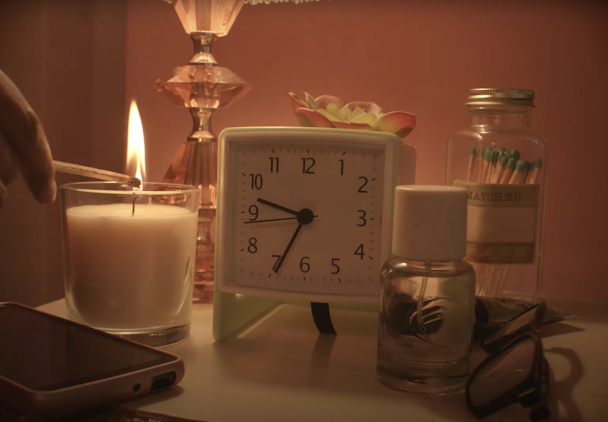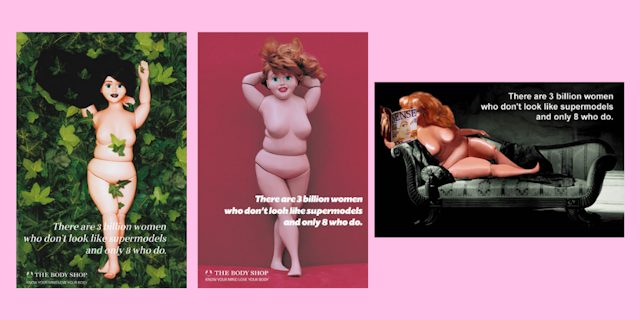
Advertisement

This year The Body Shop is focusing on Self Love
After taking a long hard look in the mirror, The Body Shop is on a journey back to its roots, using its founder Anita Roddick as a guiding light for its brand marketing. Covering masturbation and selfie culture, ‘Self Love Street’ is its latest push to help it get there. The Drum talks to its UK marketing director about how Roddick’s legacy lives on through its major self-love work.
What would Anita do? This is the North Star guiding The Body Shop as it works to reinstate Anita Roddick’s legacy after her light dimmed when the business changed hands to L’Oréal, a year before the founder’s premature death.
“We’ve been on quite a journey as a brand since we were bought by Natura three and a half years ago,” explains UK marketing director Rhiannon Scarlett. “We’re re-finding our roots and our core, thinking back to Anita.”
Roddick opened the first shop in Brighton in the heart of the progressive 70s, when women’s health and sexuality were in a moment of liberation. Trading on the moment, she led with the positioning that natural cosmetics could be feminist. 40 years later, under L’Oréal's leadership, The Body Shop had lost its way, selling a mish-mash of products that felt far away from Roddick’s shop that specialized in cruelty-free, fair trade beauty products.
Following the Natura buyout, at The Body Shop’s chief exec David Boynton’s first Christmas event in 2017, he momentously addressed a room of employees: “Where’s Anita? I don’t see Anita in this room.”
Boynton’s ambition is to bring Anita back to the heart of The Body Shop’s business strategy, which Scarlett says “he’s absolutely done”. Everything that the eco-shop does from product development to its comms has to pass the ‘what would Anita do?’ seal of approval.

Thought of as Roddick’s most famous ad campaign, in 1997 she brought out the revolutionary ‘Ruby’ campaign. ‘There are three billion women who don’t look like supermodels and only 8 who do,’ it read, next to a picture of Ruby – a size 16 red-haired doll.
An eye-opener to the public, The Body Shop was one of the first companies to challenge the unhealthy stereotypes of the idealist ‘Barbie doll’ woman. And despite the great lengths made in the body positivity movement by the likes of Dove and Sports England, thanks to the harmful onslaught of social media, 24 years later it’s hard to determine whether things have got better or worse.
“At the time, it was a first of its kind,” insists Scarlett. “There are three things from that campaign that reflect today. The Body Shop is always at the forefront. We like to be there as Anita led by doing things before everyone else. We’d like to say things that make people feel a bit uncomfortable because we’re prepared to talk about things that others are thinking but not quite ready to say. And we believe more than ever that self-love is absolutely central.”
The Body Shop began its ‘self-love’ journey back in November to December 2020 when it asked 22,000 people from 21 different countries how they rated their self-worth, happiness and wellbeing. Unearthing a universal problem, the average score of the Ipsos Mori ‘Self Love Index’ was just 53 out of a total 100, which meant nearly half of people feel more self-doubt than self-love.
“The research showed it’s a global issue, that all countries are suffering from low self-esteem. Despite all the freedom we’ve fought for, we still have strong feelings of self-doubt,” she says. “We felt it was so important we wanted it to be the lead campaign for the year.”
In the first half of the year, The Body Shop has built up a presence on social with global partnerships with the likes of TikTok, and ‘Self Love Street’ is the next level of the campaign. “We spent time as a team thinking about how we get this topic across to our audience,” she recalls, admitting they looked at the work of other brands in this area to help steer the direction. “We were looking for a piece of video content that told a personal story and hit hard. We wanted the viewer to come away feeling something thought-provoking.”
Working with ad agency Wax/On and director Ali Kurr (the mind behind the fifth installment of This Girl Can), The Body Shop’s TV campaign takes place at ‘Self Love Street’, showing three housemates who each find alternative ways to love themselves, focusing on three key issues: rejection in love, the need for external validation and body image.
Dismayed while trying to take an ‘authentic‘ selfie, Leila picks up a paintbrush and paints a beautiful portrait. Olivia, meanwhile, picks up her guitar to play for herself rather than haters on social media, and, after receiving no matches on her dating app, Fran lights a candle before indulging in a physical act of self-love (masturbation).
When Scarlett said the team wanted the ad to be “uncomfortable” and “at the forefront”, even forward-thinking Roddick might have found the masturbation an interesting watch.
Objects of the male gaze, depictions of women in advertising have long been the product of male fantasy. Sex from a woman’s perspective is still one of advertising’s greatest taboos. This is why The Body Shop’s realistic masturbation scene is all the more triumphant. It was daring but true. Women will feel seen.
“We wanted to tell real stories that represented women,” she insists. “There are many types of self-love that are individual to that person. Masturbation actually helps with physical and mental well-being.”
While previous work in the ‘Self Love’ campaign has been digitally-led, The Body Shop chose TV as the right channel for ‘Self Love Street’, specifically being broadcast during this season of Love Island.
“Unrealistic and unhealthy aspirations that take you out of your true self can be detrimental to your wellbeing and self-esteem. Reality TV shows and social media can trigger destructive and negative feelings affecting our mood, wellbeing and our self-esteem at a time when we need healthy boundaries more than ever,” explains Scarlett on the decision to air during Love Island.
Until the end of the year, The Body Shop will continue with the Self Love theme, giving women and people in the LGBT+ community the support and tools to help them achieve self-acceptance and self-love.
In the meantime, the company is in the process of truly reclaiming its animal-friendly image with plans to go 100% vegan by 2023, which Scarlett says is a natural step for the brand.
“Thanks to our founder, we were the first beauty company to fight against animal testing in cosmetics, and the first major global beauty brand to use cruelty-free musk in our fragrances,” she says. “Vegan beauty is a critical next step in our sustainability and environmental endeavors. This, along with our global refill and in-store recycling programs, as well as our B Corp certification, makes The Body Shop a destination for ethically-minded customers.”
Hey @jk_rowling here's something we made earlier, we thought you might like one! We've also popped in a vegan bath bomb and a copy of Trans Rights by @paisleycurrah for you to read in the bath! pic.twitter.com/RNbPsSTS88
— The Body Shop (@TheBodyShop) June 10, 2020
As The Body Shop works to reclaim its brand identity, the journey isn’t without hiccups. Last year it sparked outrage when it waded into the JK Rowling transgender row.
“The Body Shop’s position on menstruation in relation to trans and non-binary people is that we stand with all menstruators,” insists Scarlett when asked what lessons the shop learned from the debacle.
“People have periods – women, men and non-binary people. And plenty of women don’t. We completely understand why addressing our tweet to JK Rowling’s personal account was interpreted as an attack on her as an individual. That was absolutely not our intention. We didn’t get the tone right on this occasion and we have learned from this.”